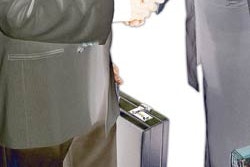Washington, DC — March 21, 2008 — Women business owners are global, green and giving back, according to over 1,200 respondents of a member survey conducted by the Women's Business Enterprise National Council (WBENC), an advocacy group for women's business enterprises (WBEs) as suppliers to corporations and government organizations.
The survey found that 25 percent of respondents have "gone global" or are in the process of going global, an overwhelming 71 percent are trying to make their businesses greener and 53 percent are giving 1-5 percent of their profits to philanthropy.
In light of the fact that more women businesses are going global, only 16 percent said outsourcing is hampering their business, and 34 percent of those surveyed said outsourcing is helping. When asked if the consolidation of the supply chain is jeopardizing their business, 67 percent said no.
"Three years ago the threat of globalization and the consolidation of the supply chain were top concerns for WBEs, but women businesses have swiftly adapted to this marketplace" said Linda Denny, president and CEO of WBENC, which is the nation's largest third-party certifier of women-owned businesses.
Denny noted that just 16 percent of the respondents said going global isn't possible. Overall, respondents selected expanding globally as their top priority for 2008, while giving more to philanthropy was number three on the list.
Of the women business enterprises that have gone global, 65 percent are working in Europe, 43 percent are in Asia and a surprisingly high 43 percent are working in the Middle East, according to the results. Of those women going global, 57 percent are doing so as a first-tier supplier to a corporation, 36 percent as a second-tier supplier, and 7 percent as a third-tier supplier.
"For WBEs, going global as a partner with your corporate client creates a win-win," said Denny. "The WBE can leverage the opportunities of doing business abroad, and the corporation can maintain the trusted, premier quality relationship with its woman supplier."
Of the 71 percent of respondents that said they are trying to make their businesses greener, 63 percent are using their company's policies and procedures most actively to have an impact, while 60 percent are greening their products (4 or 5 on a scale of 1-5). Also, 36.7 percent ranked education as a 4 or higher on the scale of techniques they are employing, 23 percent are focusing on philanthropy, and 22 percent haven't decided yet how they will go green.
Additional findings include:
The average WBENC-certified company has revenues of $7.5 million, 49 employees and 14 years of experience. More than 60 WBE firms have revenues in excess of $100 million, and six certified WBE companies have revenues in excess of $1 billion.
The survey found that 25 percent of respondents have "gone global" or are in the process of going global, an overwhelming 71 percent are trying to make their businesses greener and 53 percent are giving 1-5 percent of their profits to philanthropy.
In light of the fact that more women businesses are going global, only 16 percent said outsourcing is hampering their business, and 34 percent of those surveyed said outsourcing is helping. When asked if the consolidation of the supply chain is jeopardizing their business, 67 percent said no.
"Three years ago the threat of globalization and the consolidation of the supply chain were top concerns for WBEs, but women businesses have swiftly adapted to this marketplace" said Linda Denny, president and CEO of WBENC, which is the nation's largest third-party certifier of women-owned businesses.
Denny noted that just 16 percent of the respondents said going global isn't possible. Overall, respondents selected expanding globally as their top priority for 2008, while giving more to philanthropy was number three on the list.
Of the women business enterprises that have gone global, 65 percent are working in Europe, 43 percent are in Asia and a surprisingly high 43 percent are working in the Middle East, according to the results. Of those women going global, 57 percent are doing so as a first-tier supplier to a corporation, 36 percent as a second-tier supplier, and 7 percent as a third-tier supplier.
"For WBEs, going global as a partner with your corporate client creates a win-win," said Denny. "The WBE can leverage the opportunities of doing business abroad, and the corporation can maintain the trusted, premier quality relationship with its woman supplier."
Of the 71 percent of respondents that said they are trying to make their businesses greener, 63 percent are using their company's policies and procedures most actively to have an impact, while 60 percent are greening their products (4 or 5 on a scale of 1-5). Also, 36.7 percent ranked education as a 4 or higher on the scale of techniques they are employing, 23 percent are focusing on philanthropy, and 22 percent haven't decided yet how they will go green.
Additional findings include:
- 41 percent of respondents do not have a exit strategy and creating one was number two on their list of priorities for 2008;
- 61 percent have been WBENC certified for at least two years;
- 39 percent said they reinvest their profits in hiring and compensating their people first.
The average WBENC-certified company has revenues of $7.5 million, 49 employees and 14 years of experience. More than 60 WBE firms have revenues in excess of $100 million, and six certified WBE companies have revenues in excess of $1 billion.












